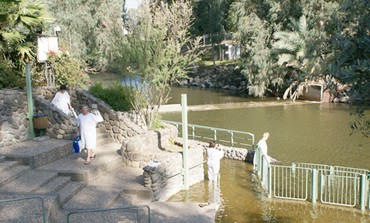For further information about Christian tourism and Holy Land tours contact info@travelujah.com.
The Jordan River flows through the Jordan Rift Valley into the Kinneret and then continues down into the Dead Sea with no outlet. It is a place of many important biblical events. However, for most Christians the first association with the river would be the scene of Jesus Christ being baptized by John the Baptist.
According to the Christian faith, the Jordan River is considered the third most holy site in the Holy Land, just after Nativity Grotto in Bethlehem and Golgotha in Jerusalem, because it is the site of the most important event of Jesus’ life - his baptism and beginning of his ministry.
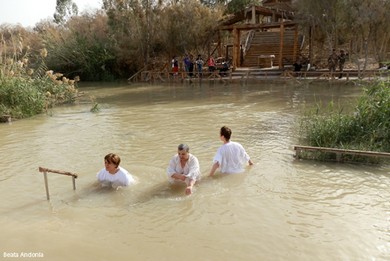
The Jordan River represented a perfect mikva of
continuously running water.
John is also commonly referred to be a precursor of Jesus,
and the Gospel of Matthew describes him as the person
mentioned by Isaiah in his prophecy: “A voice of one
calling in the wilderness,
‘Prepare the way
for the Lord, make straight paths for him.’”
(Isaiah 40:3) John also announced that Christ - the
Messiah is coming, with the words: “I baptize you
with water for repentance. But after me comes one who is
more powerful than I, whose sandals I am not worthy to
carry. He will baptize you with the Holy Spirit and
fire.” (Matt. 3:11)
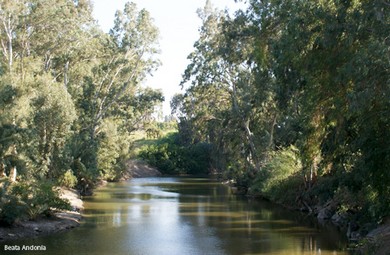
Christ was baptized in the Jordan River by John the Baptist. Baptism with water, practiced since the beginning of the Church, represents admission into the Christian community and is essential for salvation. "Truly, truly, I say to you, unless one is born of water and the Spirit, he cannot enter into the Kingdom of God." (John 3:5) In Christianity, baptism is a sign of “repentance and forgiveness of sins” (Mark 1:4) and the beginning of the life in Christ within the Church. Christians are baptized in the name God: “Father, and the Son and the Holy Spirit” (Matt. 28:19). As well, through baptism Christians associate with the death, burial and resurrection of Jesus: “And this water symbolizes baptism that now saves you […] by the resurrection of Jesus Christ.” (1 Peter 3:21)
Different Christian denominations have various baptismal practices. Orthodox and Catholic Christians receive the sacrament when still infants. The Catholic baptism is done by effusion, meaning pouring water over someone’s head.
However, according to the rituals of the Orthodox and some other Eastern Churches, a baby would be completely submersed in water. Within the Anabaptist (baptised again) and Baptist practices, a person would receive baptism as an adult in order to understand the significance and be aware of accepting Christ as a Saviour.
Site of Jesus’ Baptism - Qasr el Yahud
Qasr el Yahud, one of the most important sites for Christian pilgrims visiting the Holy Land, is identified as the traditional site of Jesus’ baptism. The place is located in the wilderness of the Jordan River Valley, north of the Dead Sea and east of Jericho. Remains of a Byzantine church from the 4-5th century, still visible on the site, point to the ancient tradition associate with this site.
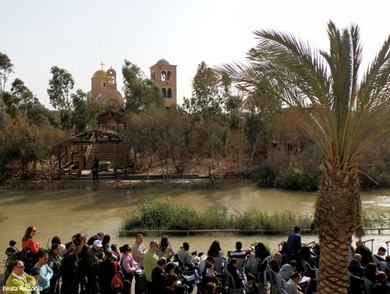
The Baptism of the Lord Celebration is a feast commemorating the baptism of Jesus in the Jordan River by the John the Baptist. In the Holy Land, this event takes place at Qasr el Yahud.
According to the Catholic Church’s tradition, the holiday is celebrated on the first Sunday after the feast of Epiphany. This year, Catholics will make a pilgrimage to the site on January 13 and hold a mass in a chapel on the riverbank.
January 18 and 19 will mark the Feast of Theophany, which for the Eastern Churches denotes Christ’s baptism and first revelation as the Son of God and the revelation of the Holy Trinity. On the morning of January 18 a procession of Eastern Orthodox clergy and pilgrims would follow down to the river bank, where the celebration will be held. The Patriarch, by submerging the cross in the river will purify and consecrate its water, which then shall be sprinkled on the crowds of faithful. In the afternoon the Ethiopian Orthodox Church will celebrate the Baptism at the site. On the morning of January 19, the baptismal celebrations will be held by the Coptic Orthodox and the Syrian Orthodox Churches.
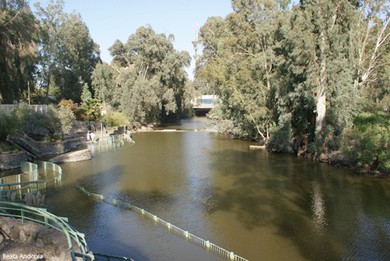
Qasr el Yahud is just north of the Dead Sea. If driving from Jerusalem, take the Route 1 towards Jericho’s bypass road, then turn north on the Route 90, drive approximately 2.5 km until you reach a grove, and then turn east in the direction of a sign saying Qasr al-Yahud. Currently, there is no public transportation which goes exactly to the site. Hiring a taxi driver or a private tour could be an option.
Opening hours:Qasr el Yahud is open daily from 8 a.m. till 5 p.m. in the summer and till 4 p.m. during the winter, except on Fridays from 8 a.m. till 3 p.m. (summer) or till 2 p.m. (winter). There is no entry fee. Pilgrims are advised to call before visiting on (02) 650-4844.
Yardenit
Many pilgrims come to the Holy Land especially to be baptized in the Jordan River, thus the site of Yardenit was established in 1981 as a result of the closing of Qasr el Yahud, which occurred at the time due to the unstable political situation in the region. This picturesque baptismal site, located south of the Jordan River's outlet from the Sea of Galilee, welcomes everyone who would like to walk in the footsteps of Jesus and follow Jesus’s life by experiencing the baptismal waters.
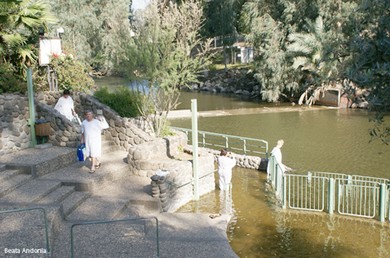
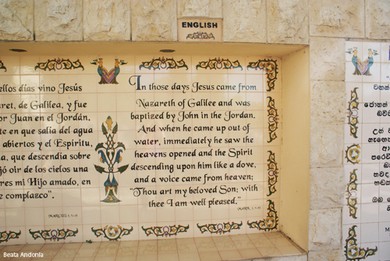
How to get there: If driving a car, follow the signs leading to the Yardenit baptismal site along the road between Tiberias city and the Tzemach junction to its east. If you are thinking to take a public transportation from Jerusalem, Egged bus 961, which continues to Yardenit, leaves from Jerusalem Central Bus Station at 2:15 pm and 3:15 pm. After 2 hours and 35 minutes on the way, go off at the bus stop next to Ezori Beit Yerah School and then walk south around 250 meters.
Opening hours:March - November: Sun. – Thur. from 8 a.m. till 6 p.m. and on Friday from 8 a.m. till 4 p.m. December – February: Sun. – Thur. from 8 a.m. till 5 p.m. and on Friday from 8 a.m. till 4 p.m. Call on (04) 675-9111 to check site’s opening hours around the major Jewish holidays. There is no entry fee.
Beata Andonia works for the Bethlehem tourist bureau and blogs regularly about Bethlehem for Travelujah-Holy Land Tours. She is originally from Poland and moved to Bethlehem in 2010.
